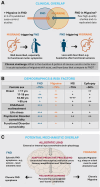Migraine and functional neurological disorder (FND)-a review of comorbidity and potential overlap
- PMID: 40799284
- PMCID: PMC12343001
- DOI: 10.1093/braincomms/fcaf288
Migraine and functional neurological disorder (FND)-a review of comorbidity and potential overlap
Abstract
Migraine and functional neurological disorder (FND) are two of the most common conditions in neurological practice. It is assumed that the two conditions have distinct underlying mechanisms. However, it can be clinically challenging to disentangle their relative contributions to a patient's symptoms. In addition, apart from the relationship between persistent postural perceptual dizziness (PPPD) and migraine, the frequency of co-occurrence has not been characterized in detail. Contemporary conceptualizations of FND have driven a re-evaluation of its relationship to other neurological disorders, including migraine. We carried out a narrative review of the literature examining the co-occurrence of migraine and FND. We also explored their comorbidities, aetiological risk factors and mechanisms, focusing especially on areas of potential overlap. Our review suggests increased frequency of migraine in people with functional seizures compared to epilepsy, but data from people with functional motor symptoms is mixed. Robust epidemiological studies evaluating the frequency of FND in migraine are lacking. Similar to other neurological disorders, migraine is an established trigger of FND. Female gender, adverse childhood experiences and comorbid psychiatric and functional disorders, such as irritable bowel syndrome and fibromyalgia, are more common in both conditions than in controls, but perhaps more so in FND. Mechanistic research in both conditions highlights converging frameworks of dysregulated allostatic/stress responses in the context of predictive processing models of the brain. This has implications for pharmaceutical and rehabilitation treatments. The relationship between migraine and FND is poorly studied. An overview of their overlap offers a model of non-dualistic thinking within a clinical neuroscience framework for future studies.
Keywords: comorbidity; conversion disorder; epidemiology; functional neurological disorder; migraine.
© The Author(s) 2025. Published by Oxford University Press on behalf of the Guarantors of Brain.
Conflict of interest statement
J.S. reports honoraria from UptoDate, personal fees from Expert Witness Work and grants from Chief Scientist Office, outside the submitted work, and runs a self-help website, www.neurosymptoms.org, for patients with functional neurological disorder; he is the president elect of the FND Society and on medical advisory boards to FND Hope, FND Hope UK and FND Action. J.C. reports personal fees from Expert Witness Work and speaker fees from Merck Serono and Bial. L.K. reports no potentially relevant conflicts of interest. M.B. reports no potentially relevant conflicts of interest. T.R.N. reports honoraria for textbooks and talks on FND and other medical topics, personal fees from Expert Witness Work and research grants from the UK National Institute for Health and Care Research on FND and other disorders. D.W.D. reports consulting, AbbVie, Genentech and Nocira, and honoraria, Wolters Kluwer, Oxford University Press and Cambridge University Press. Stock options/shareholder/patents/board of directors: Ctrl M (options), Aural analytics (options), Axon Therapeutics (board/options), ExSano (options), Palion (options), Keimon Medical (Options), Man and Science, Healint (options), Theranica (options), Second Opinion/Mobile Health (options), Epien (options), Nocira (options), Matterhorn (shares), Ontologics (shares), King-Devick Technologies (options/board), Precon Health (options/board), ScotiaLyfe (board), EigenLyfe (options/board), AYYA BioSciences (options), Nuvie Bio (options/board), Cephalgia Group (options/board) and Atria Health (options/employee). Patent 17189376.1-1466:vTitle: Onabotulinum Toxin Dosage Regimen for Chronic Migraine Prophylaxis (non-royalty bearing).
Figures
References
-
- Stone J, Carson A, Duncan R, et al. Who is referred to neurology clinics?—The diagnoses made in 3781 new patients. Clin Neurol Neurosurg. 2010;112:747–751. - PubMed
-
- Dodick DW. Migraine. Lancet. 2018;391:1315–1330. - PubMed
-
- Eggers SDZ, Staab JP. Vestibular migraine and persistent postural perceptual dizziness. In Handbook of clinical neurology: Migraine management. Elsevier B.V.; 2024:389–411. - PubMed
Publication types
LinkOut - more resources
Full Text Sources


